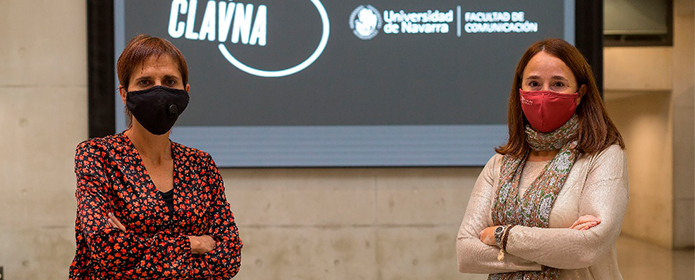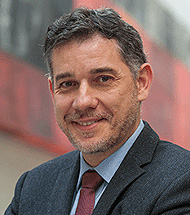20000303-Más de 300 periodistas homenajean al profesor Francisco Gómez Antón en la Universidad de Navarra
More than 300 journalists pay tribute to Professor Francisco Gómez Antón at the University of Buenos Aires
More than 300 graduates of the School of Communication accompanied Professor Francisco Gómez Antón in the tribute paid to him by the University of Navarra. For 44 years Gómez Antón has worked in Pamplona and has taught dozens of graduating classes of communicators.
In the tribute, held in the Magna classroom , José Antonio Vidal-Quadras (professor of Communication and Written Information), Mª José Canel (professor of Contemporary Legal and Political Institutions), José María García-Hoz (journalist) and Carlos Soria (professor of Communication Ethics) took part. The closing ceremony was position over by the President, Professor José Mª Bastero.
During his speech, journalist José María García-Hoz recalled the years when he was a student of the honoree: "He did not overwhelm us with unassimilable loads of data, but provoked our puerile intelligences by displaying before them a fabulous, masterful professor capacity. He demonstrated that, in the internship, from the most unassuming specialization program , the fuse could be primed to initiate the process of knowledge and reflection".
García-Hoz pointed out how Professor Gómez Antón never ceased to warn about the "fallacies" of neutrality. The facts are the way they are," he said. Everyone can interpret reality as they wish and all opinions must be respected, but the objectivity of giving five minutes to Hitler and five minutes to the Jews made no sense or justification".
Laughter is the key to the letterThe veteran professor's ability to deal rigorously with highly complex issues has also been underlined by another of his disciples, Professor Mª José Canel. "His explanations were like magic. He took us by simple paths to the nerve of the issues and, once there, any difficulty was diluted. With them, Don Francisco managed to enthuse us so that we would search in the past for the reason for the present, and thus be able to enter into the future".
Never simplistic or closed answers that, in the opinion of Mª José Canel, offer keys for each student to develop their own thinking, from anecdotes and humor. "It can be said that he has exchanged the saying 'the letter enters with blood' for 'the letter enters with laughter'".
Sponsor promotion after promotion, the students have presented him each year with the distinction awarded to the beloved teacher. For Professor Canel, the secret of this great "maestro" lies in his sensitivity towards people. "I have seen him be moved by the illness of one student, worry about the economic problems of another, or enjoy the roguery of the clever one. I am convinced that Paco travels the world with a simple look that rests with affectionate intensity on all things. A look that allows him to learn from the farmer, the shepherd, the traffic guard, the hotel bellboy, the deputy or the president of a republic. And a look with which he gets to tune in with other cultures, to the point of being able to describe them in a close and non-stereotypical way".
Carlos Soria, Dean of the School of Communication during the years when Francisco Gómez Antón was Associate Dean, pointed out his ability to communicate, "as well as to make and care for friends, to break the ice of indifference or misunderstandings, to highlight the value of any man and to watch over -with a voluntary attack of amnesia- all the dust, all the detritus of other people's lives".
Professor Soria drew the profile a professor "with a magnificently furnished head" and a university student "unequivocal, resounding, made in one go, a faithful friend of fidelities, vital and cheerful, tough and full of virile tenderness, with a great and open intelligence and heart, placed at the service of his vocation as a forerunner".
From the experience of a friendship woven over thirty-three years shared in the faculty the School of Communication, Carlos Soria expressed his amazement at the wisdom shown by his colleague to live passionately what life has been putting in his hands. "And in his life there are thousands of his students, his friends, his written pages, his smoked black cigarettes, his international hours in almost all over the world. In America, especially from the Rio Grande to Patagonia or Tierra de Fuego, Gómez Antón has been the driving force, with the PGLA, of one of the most effective revolutions -for being honest, quiet and peaceful- that Latin American journalism has known so far".
Intelligence and heart in difficult issuesAnother veteran of the School of Communication, Professor José Antonio Vidal-Quadras, highlighted the constant spirit of service and the human quality of his colleague: "With his intelligence and great heart he has managed to move forward the most difficult matters. All those who have placed their trust in him have rested assured of his loyalty.
For his part, Professor Francisco Gómez Antón responded to the words of his disciples and colleagues with modesty. "They are excellent journalists, but their speeches are riddled with errors. In spite of everything, I must thank them because they have distorted reality with a love that is, if not blind, myopic".
The honoree pointed out four reasons why he decided to remain at the University of Navarra for 44 years. First, he referred to "the objective fascination of translating the spirit and ideas of the mothers into operational reality. Secondly, he mentioned "the quality of the work environment". In this regard, he reviewed some relevant aspects of his relationship with four of the rectors with whom he has developed his projects. He also highlighted "the indescribable pleasure of teaching and learning", as well as the staff and professional richness that his trips to other countries had provided him with...
Finally, the President thanked "the gift of Professor Gómez Antón coming as a pioneer to this exciting adventure that is the University of Navarra". In his opinion, the service that Francisco Gómez Antón has rendered to his School of Communication cannot be measured. "He is an extraordinary teacher who seeks and succeeds in motivating his students, whose teaching leaves a stimulating mark that does not fade with the passage of time. He is also a profound connoisseur of contemporary legal and political institutions, a subject in which he enjoys a well-earned prestige for his publications. But, above all," added Professor José Mª Bastero, "he is a complete university man, a man in love with and committed to the truth and unreservedly devoted to his educational vocation.



